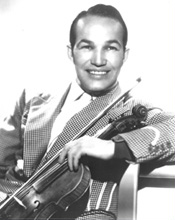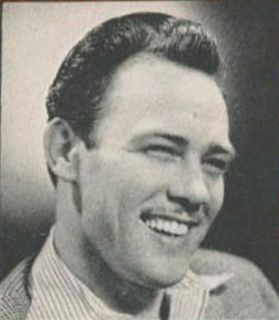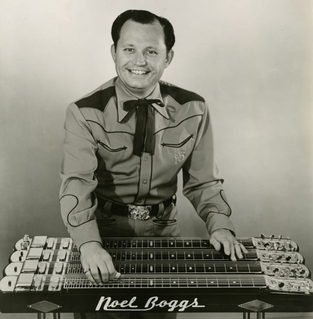Western swing music is a subgenre of American country music that originated in the late 1920s in the West and South among the region's Western string bands. It is dance music, often with an up-tempo beat, which attracted huge crowds to dance halls and clubs in Texas, Oklahoma and California during the 1930s and 1940s until a federal war-time nightclub tax in 1944 contributed to the genre's decline.
While the music of Oklahoma is relatively young, Oklahoma has been a state for just over 100 years, and it has a rich history and many fine and influential musicians.
Western music is a form of country music composed by and about the people who settled and worked throughout the Western United States and Western Canada. Western music celebrates the lifestyle of the cowboy on the open ranges, Rocky Mountains, and prairies of Western North America. Directly related musically to old English, Irish, Scottish, and folk ballads, also the Mexican folk music of Northern Mexico and Southwestern United States influenced the development of this genre, particularly corrido, ranchera, New Mexico and Tejano. Western music shares similar roots with Appalachian music, which developed around the same time throughout Appalachia and the Appalachian Mountains. The music industry of the mid-20th century grouped the two genres together under the banner of country and western music, later amalgamated into the modern name, country music.

Donnell Clyde Cooley, better known as Spade Cooley, was an American convicted murderer and former Western swing musician, big band leader, actor, and television personality. In 1961 he was arrested and convicted for the April 1961 murder of his second wife, Ella Mae Evans.

William Lemuel Boyd was an American Western-style singer and guitarist.
This is a list of notable events in country music that took place in 1961.

Herbert Clayton Penny was an American accomplished banjo player and practitioner of Western swing. He worked as a comedian best known for his backwoods character "That Plain Ol' Country Boy" on TV with Spade Cooley. He was married to country singer Sue Thompson from 1953–63.
Clifford Gilpin Snyder, professionally Cliffie Stone, was an American country singer, musician, record producer, music publisher, and radio and TV personality who was pivotal in the development of California's thriving country music scene after World War II during a career that lasted six decades. He was inducted into the Country Music Hall of Fame in 1989.
The Morris Brothers were an American country music group particularly popular in the 1930s, although they continued to play together occasionally until the 1970s.
Ernest Earl "Jimmy" Walker was an American country musician.
James Otis Wyble was an American guitarist noted for his contributions to jazz and Western swing.
The Aragon Ballroom on Lick Pier in the Ocean Park district of Santa Monica, California, was a social-dance venue opened under the Aragon name in March 1942 by dance promoter Harry Schooler.
"Shame on You" is a Western Swing song written by Spade Cooley and became his signature song.
"Take Me Back to Tulsa" is a Western swing standard song. Bob Wills and Tommy Duncan added words and music to the melody of the traditional fiddle tune "Walkin' Georgia Rose" in 1940. The song is one of eight country music performances selected for the Rock and Roll Hall of Fame's "500 Songs That Shaped Rock & Roll".
Mack Magaha was an American bluegrass fiddler best known as a member of Porter Wagoner's band, and a long-time backup player in the pioneering bluegrass band, Reno and Smiley.

Adolph John Hofner was an American Western swing bandleader and singer.

Zeke Clements was an American country musician often dressed in a Western outfit. He was known as "The Dixie Yodeler."
William Hundley Emerson, Jr. was an American five-string banjo player known for being one of the founding members of the original The Country Gentlemen and Emerson & Waldron and considered one of the finest bluegrass banjo players in music history.
Westerns swing originated in the 1920s and 1930s; small towns in the US Southwest. Although sometimes subject to the term "Texas swing" it is widely associated with Tulsa, others contend that "Western Swing music finds deep roots in the dust bowl of Oklahoma", and its influences include jazz from the major urban centers of the United States. Its stylistic origins lie in Old Time, Western, blues, folk, swing, Dixieland and jazz. Writing in Rolling Stone, Dan Hicks described it as Texas-bred music grafted to jazz, or as "white country blues with a syncopated beat.".

Noel Edwin Boggs (1917–1974) was an American musician who was a virtuoso on the lap steel guitar and a member of the Steel Guitar Hall of Fame. He was one of the pioneers in electric steel guitar who helped popularize the instrument beyond its native Hawaiian music into other genres of American popular music, specifically Western Swing. Boggs played and recorded with almost every major artist in the genre including Bob Wills and His Texas Playboys (1944-1945) and Spade Cooley's Dance Band. Bob Wills' band helped define the guitar's role in western swing; Wills discovered and coached innovative guitarists who deeply influenced country, rock and jazz music. Boggs appeared on some 2000 recordings as a soloist and his playing was prominent on several of Wills’ hits that became Western swing standards, including "Roly Poly" and "Stay a Little Longer".